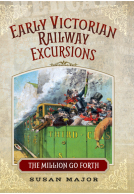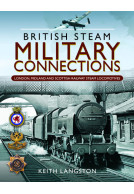Female Railway Workers in World War II (ePub)
Imprint: Pen & Sword Transport
File Size: 4.2 MB (.epub)
Pages: 185
ISBN: 9781526703101
Published: 3rd August 2018
| Other formats available - Buy the Hardback and get the eBook for free! | Price |
|---|---|
| Female Railway Workers in World… Hardback Add to Basket | £19.99 |
During World War II women took on railway roles which were completely new to females. They worked as porters and guards, on the permanent way, and in maintenance and workshop operations. In this book Susan Major features the voices of women talking about their wartime railway experiences, using interviews by the Friends of the National Railway Museum. The interviews cover many areas of Britain.
Many were working in ‘men’s jobs’, or working with men for the first time, and these interviews offer tantalising glimpses of conditions, sometimes under great danger. What was it about railway work that attracted them? It’s fascinating to contrast their voices with the way they were portrayed in official publicity campaigns and in the light of attitudes to women working in the 1940s. These women talk about their difficulties in a workplace not designed for women – no toilets for example, the attitudes of their families, what they thought about American GIs and Italian POWs, how they coped with swearing and troublesome colleagues, rules about stockings. They describe devastating air raids and being thrust into tough responsibilities for the first time.
This book fills a gap, as most books on women’s wartime roles focus on the military services or industrial work. It offers valuable insights into the perceptions and concerns of these young women. As generations die out and families lose a direct connection, it becomes more important to be able to share their voices with a wider audience.
This book has much to recommend it to a wide range of researchers working in the field of history. Individuals examining the histories of labour, war and transport, as well as women’s studies, will find areas of interest in this publication. Oral historians will also find it useful to see the different ways personal testimony can be used to write a microhistory of war.
Oral History - Autumn 2021
Review by: Hannah Reeves, Keele University, Staffordshire
Journal of Transport History, 2019, Vol. 40(1)
Overall this fascinating book, appealing to both transport and women historians, details the daily realities of life for women working on the railways during the Second World War. It does this effectively by using extracts from the oral history interviews, allowing these workers to tell their own stories, using their own words. Whilst there is still much more work to be done around the subject of women and the railway industry, this book acts as an excellent introduction to the subject and to the NAROH collection.
I can recommend this book wholeheartedly as a good read, as a distinct source of an important aspect of our social history, and in showing positive aspects of a terrible war.
Aberdeen and North East Scotland FHS - reviewed by Elizabeth Jordan
"A well-chosen selection of photographs of women undertaking the full range of tasks enhances the stories."
North West Labour History Journal
Read the full review
Click here
Article: 'Those were the days - 1943: Elizabeth flies the flag for female rail workers' as featured by
Scottish Herald, 25th January 2020 - words by Russell Leadbetter
As featured in
Local Historian, October 2019
Susan Major's introductory overview, her brief outlines at the start of each chapter, and the extracts which she has selected, combine to make this book an important contribution to British local and social history. It is a valuable addition to the history of women in Britain in World War Two, shedding light on a less familiar area of women's work. At the same time I believe that it will point the way to the study of the male railway workers who work alongside the women. The fact that the extracts come from many parts of the country adds to the book's attractions.
Paul Rusiecki, The Local Historian, Oct 2019
Featured in
Glasgow and West of Scotland Family History Society
Susan Major has written previously about railway social history and this book fills a gap about women's work in wartime, which has previously tended to focus on the military services or industry.
Review by John Hutchings, Friends of the National Archives.
In March 1941, Ernest Bevin, Minister of Labour launched a plea for 100,000 women to enrol for work in farms, factories and on the railways to replace men recruited into the forces. Within a year there were over 80,000 railway women working among other things as porters, painters, guards, ticket collectors, van drivers, mechanics, locomotive cleaners, and in track maintenance, signals and engineering workshops. They coped with expectations that women could not do the heavy physical work such as shifting goods traditionally reserved for men, the negative attitudes of some of their families, the need to balance child care with employment, and even the lack of female lavatories. Many were paid less than men doing the same work and despite having performed invaluable service contributing to the war effort, most were made redundant after 1945.
The book will be of interest both to social historians and railway enthusiasts, especially in what it exposes about attitudes to women and female employment three quarters of a century ago. Much of the content is transcribed interviews from the women themselves, describing such things as being thrust while very young into tough responsibilities for the first time, or living through devastating air-raids, when for example York Station was heavily bombed.
However were women ever allowed to become locomotive drivers and work on the footplate such as was happening on Soviet railways? Sadly not, the trade union taking the view that such physical work would not "fall within their physical capabilities and mental outlook." I would hope that a different view would prevail if we still had mainline steam locomotives in 2019.
A fascinating account of the wartime working lives - sometimes dangerous under devastating air-raids - of the ladies working with men on the railway for the first time and taking on their roles to keep a vital service running. The book also provides an interesting insight into the railway women's perceptions and concerns they faced at the time.
Essex Family History Society
Major is to be congratulated at ensuring that wartime memories are told, and that the women and their wartime work are remembered in their own words.
Great Eastern News, Spring 2019 - reviewed by Peter Barham
In this book Susan Major draws upon the National Railway Museum's National Archive of Railway Oral History and the research of Alan Hammond of the Somerset & Dorset Railway to present a panorama of the reminiscences of women employed on the railways in the Second World War.
Railway & Canal Historical Society
As featured by
This England, March 2019 (Spring)
As featured on The History Girls
The History Girls
As featured on Express Digital
Express Digital
This is an interesting record of an industry and a particular period in its history, and this archive of oral history is a valuable resource. I hope other industries have something similar.
Journal of Kent History
Many women responded to the call and this book not only details the perceptions and concerns of women at this time but for family historians it will fill gaps in the lives of the women who were not only wartime workers but were wives, mother and daughters.
Scottish Association of Family History Societies
This book is a fascinating insight into six years of British railway history told by those who were there some 75 years ago. The social attitudes of the day and the working conditions are so different to today. It is well worth reading not only for its railway history but also for the social history of those turbulent six years. The author has made great use of NAROH; it is hoped that future books will draw on this valuable resource.
Friends of the National Railway Museum
This interesting and readable book is a welcome addition which recognises the very great contribution the women made to the railways during WWII. It joins the recognition given to the Land Girls, the female steel workers of Sheffield, the pilots delivering RAF planes and many others that the Nation has been slow, or reluctant to acknowledge.
Cumbrian Railways Association
A worthy look at an under-reported area.
The Armourer, January 2018
Author article 'Holding the line' as featured by
The Armourer, January 2018
Every page contains fascinating reminiscences of what life was like for nearly six years.
Heritage Railway, issue 271
This book is a fascinating insight in to six years of British railway history told by those who were there some 75 years ago. The social attitudes of the day and the working conditions are so different from today. It is well worth reading not only for its railway history but also for the social history of those turbulent six years. The author has made great use of NAROH; it is hoped that future books will draw on this valuable resource.
Journal of the Friends of the National Railway Museum No.165
As featured in
Glasgow & West of Scotland FHS
Revealing book.
South Wales Echo, reviewed by Barry Lee
Even today this book is notable for being a railway history book written by a woman, about only women. Railways have tended to be a niche market, featured in books by men, for men; railway books authored by women are few and far between. War is often the way in for such books and such authors. War also presents a window of opportunity for women, not least because it brings them into the public arena and into mainstream consciousness.
Who Do You Think You Are? Magazine, October 2018 - reviewed by Dr Rosa Matheson
In her introductory chapter Susan Major shows how women’s entry into railway work during the Second World War happened in fits and starts, overcoming the reluctance of company, union and railwaymen, as the Government made determined propaganda efforts to recruit these vital war workers while allaying men’s worries for their jobs. The other chapters are oral history in print, taken verbatim from recorded interviews. Here Major has forefronted the women’s own voices and allowed us to hear them directly. Their stories are cleverly placed under chapter headings that highlight their changing experiences over the war years.
What shines through is the pride the women took in ‘doing their bit’. This book is a fitting tribute.
As featured by
Railwatch magazine, October 2018
BOOK OF THE MONTH
Barnsley Chronicle, 21st September 2018
Railway Museum Blog
Article: 'When women ran the railways...' as featured by
York Press (online & print), 8th September 2018 - words by Stephen Lewis
About Susan Major
As an historian and independent researcher, Susan is particularly interested in the way that the working classes used railways in the mid-19th century and how it affected their leisure mobility. She completed a research Masters (2005) and PhD degree (2012) with the Institute of Railway Studies at the University of York. Her PhD focused on early excursion crowds, using resources offered by the National Railway Museum in York. Her book on this subject, Early Victorian Railway Excursions (2015), was translated into Japanese last year. Her subsequent research focused on the experiences of women working on the railways in wartime, again using oral history resources in the National Railway Museum, and published as Female Railway Workers in World War II (2018). She has appeared in a number of television programmes talking about her railways researches, Susan also writes local history books for Clements Hall Local History Group in York. She is a Fellow of the Royal Historical Society.

















